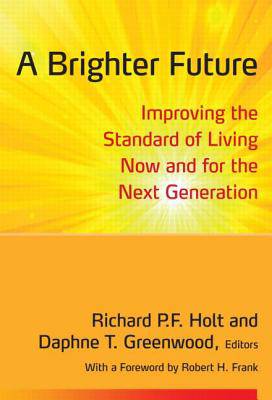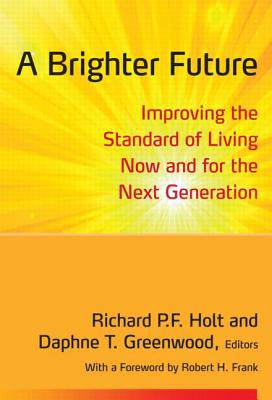
- Afhalen na 1 uur in een winkel met voorraad
- Gratis thuislevering in België vanaf € 30
- Ruim aanbod met 7 miljoen producten
- Afhalen na 1 uur in een winkel met voorraad
- Gratis thuislevering in België vanaf € 30
- Ruim aanbod met 7 miljoen producten
A Brighter Future
Improving the Standard of Living Now and for the Next Generation
Richard Holt, Daphne GreenwoodOmschrijving
As the United States continues its slow climb out of the Great Recession, it is important to focus on new directions to improve the standard of living in America. This book explores what is behind a faltering standard of living in the United States since the early 1980s and what can be done to restore it. The book is uniquely valuable in going beyond mainstream thinking about how to restore prosperity. Economics has traditionally equated economic growth (increases in per capita income) with improvements in quality of life and the standard of living. This book questions that assumption. The different chapters in the book show the standard of living as being more than income, to include many non-market aspects such as access to public goods (roads, clean air and water, schools, parks, and museums), intangible aspects of quality of life such as equity and a sense of community, and broadly based economic opportunities. This means that improving the standard of living is a multi-dimensional challenge rather than one of solely increasing aggregate demand, productivity, or GDP. This book embodies a pluralistic approach and draws on the expertise of a wide array of thinkers. The intended audience is for various courses offered in economics, sociology, political science, public policy programs, and in environmental and ecological studies.
Specificaties
Betrokkenen
- Auteur(s):
- Uitgeverij:
Inhoud
- Aantal bladzijden:
- 261
- Taal:
- Engels
Eigenschappen
- Productcode (EAN):
- 9780765634894
- Verschijningsdatum:
- 16/09/2014
- Uitvoering:
- Paperback
- Formaat:
- Trade paperback (VS)
- Afmetingen:
- 188 mm x 231 mm
- Gewicht:
- 498 g

Alleen bij Standaard Boekhandel
Beoordelingen
We publiceren alleen reviews die voldoen aan de voorwaarden voor reviews. Bekijk onze voorwaarden voor reviews.











